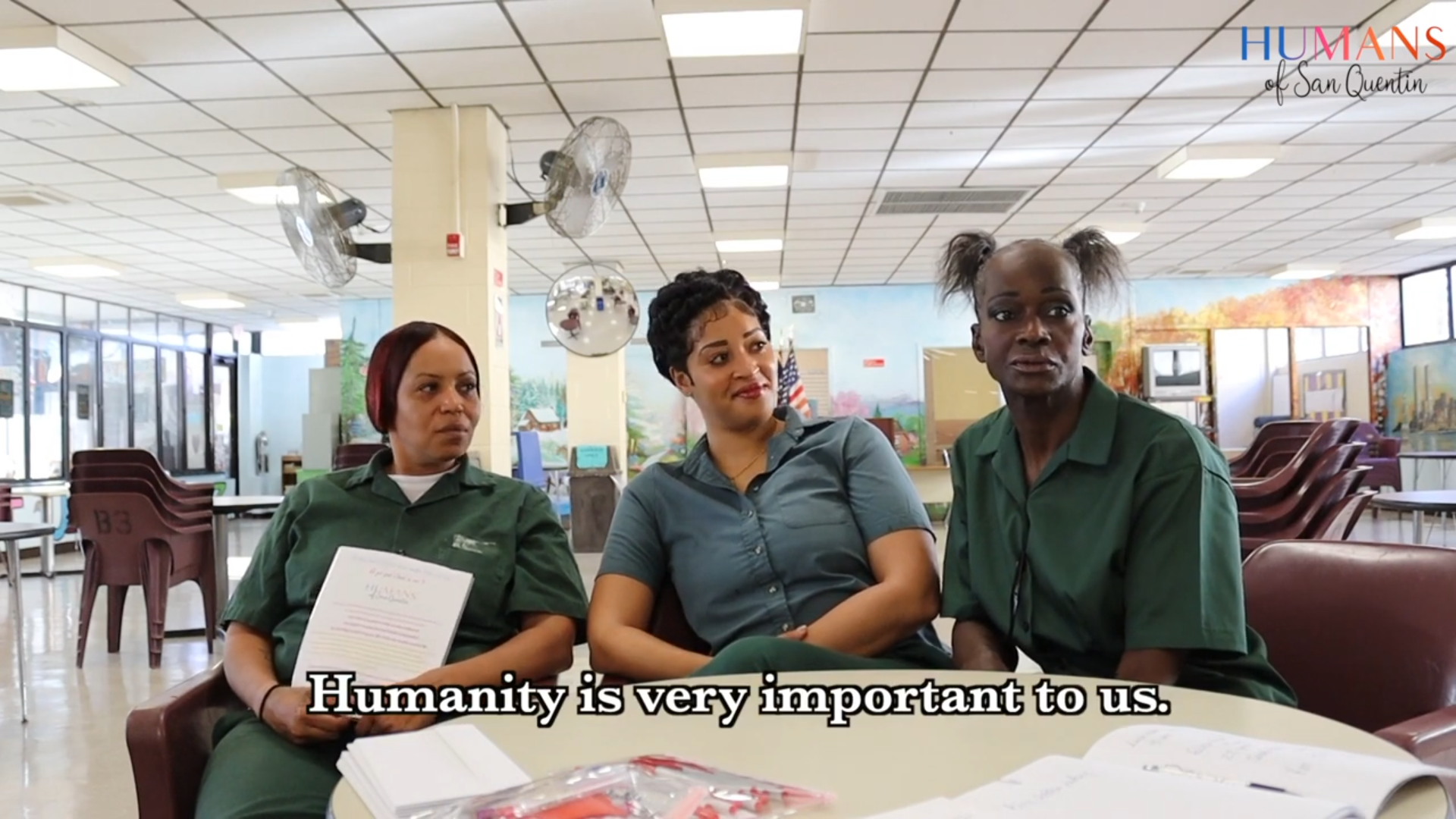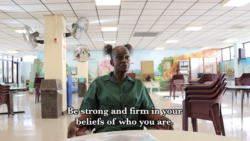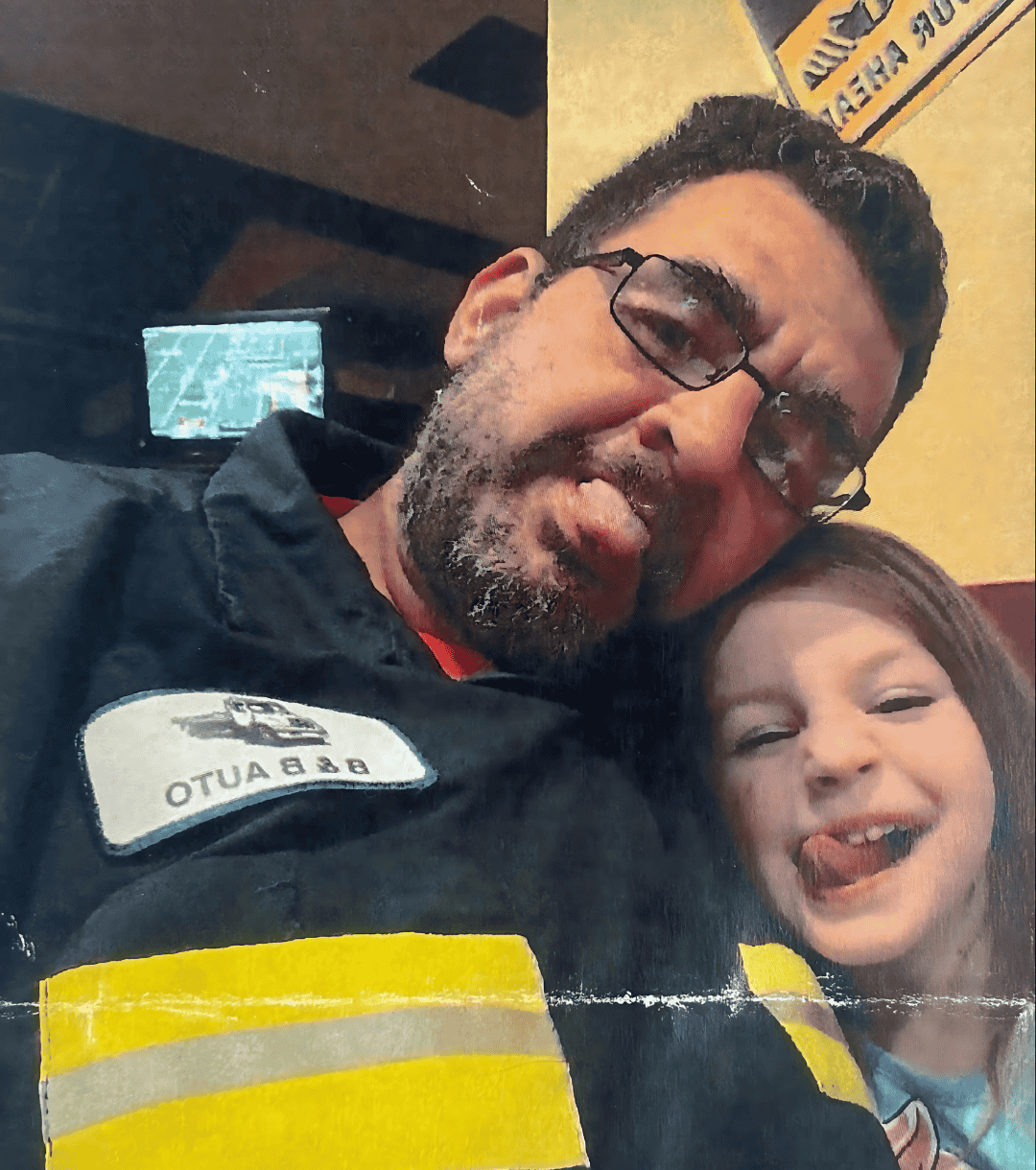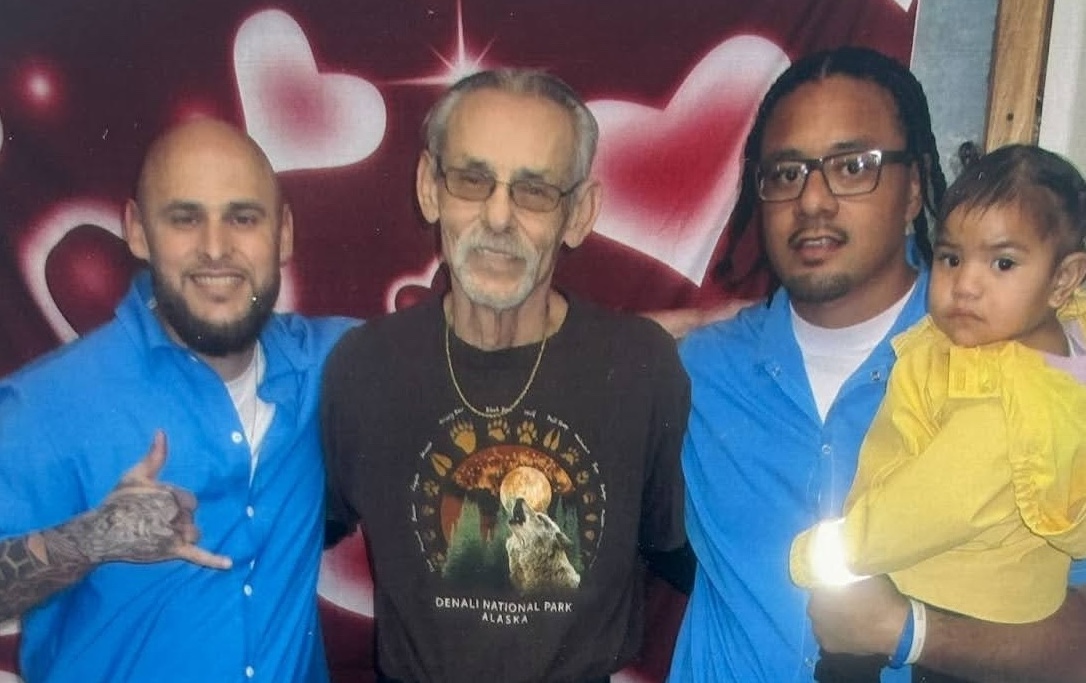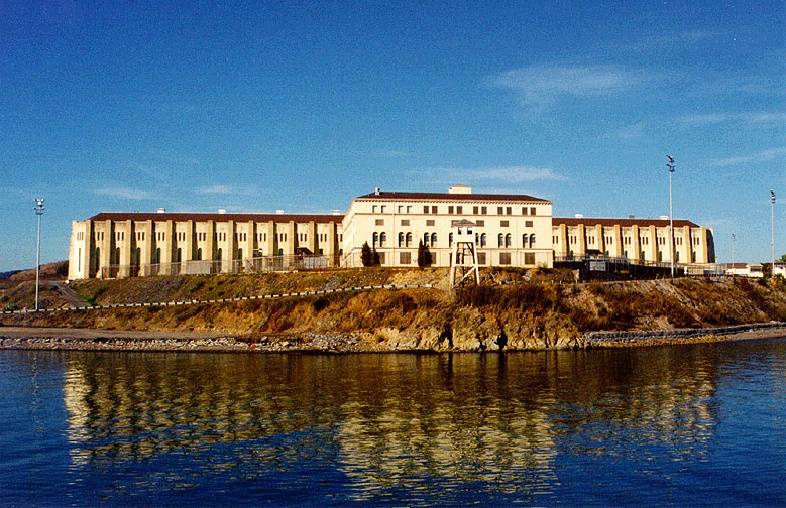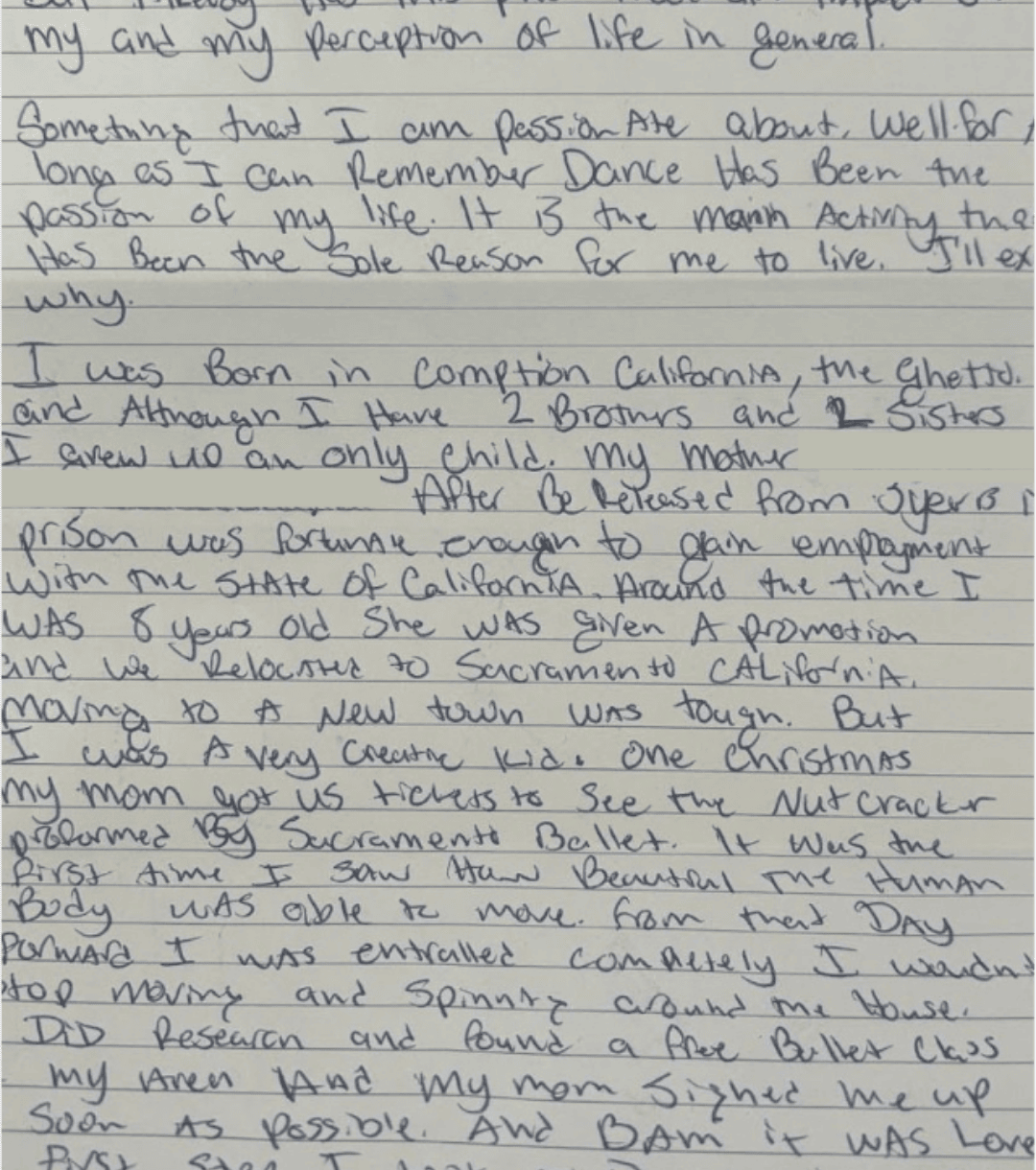Watch the Video:
Video Transcript
Kayla: Totally, I’ve been incarcerated for forty-two and a half years. I’ve been in prison since I was 19 years old. In December, I’ll be 59. I’ve been incarcerated for 39 straight years, 38 years in maximum security prisons for men throughout the state of New York – Attica, Clinton, Auburn, Comstock, Greenhaven, Sing Sing – you name it, I’ve been there 1, 2, 3, 4 times. Unfortunately, I grew up in the state prisons. From institutions, jail, DFY – Division for Youth – to the state prison. I don’t have no family, unfortunately. I’m doing this bid alone. I lost my mom. Throughout the incarceration, I’ve suffered a lot of tragedy. Me being a trans woman, growing up in this environment and being out, it was not easy. I suffered a lot. Attempted rapes. A lot of brutality. A lot of violence. I’m thankful and I thank God every day because I survived through the storm. Today, I am grateful that I have been transitioned from the men’s prison to the female prison approximately 18 months ago. It’s so much better, and I’m doing great here.
Diane: How was it transitioning in prison?
Kayla: The transition form there to here was kind of hard because it’s two different worlds. The female prison versus the men’s’ prison is a lot different. The men’s prison is more physical, more violent. The female prison is more psychological, more catty. The transition was very hard, because I’m used to the violent atmospheres. I’m used to being in what we call “go time,” ready to go at any time. I was grateful from the moment I walked into Bedford Hills because the peace, you could feel it. I was welcomed with open arms, and I had never been welcomed with open arms until that moment. I had to fight every step of the way. As soon as I got to Bedford Hills – the women’s – they didn’t know at first that I was a trans woman, and still they accepted me with open arms. And it was a beautiful experience.
Diane: How has the administration been with you changing?
Kayla: For the most part it’s been good, but we’re always going to have the stereotypical individuals who want to pass judgment, and those ones can try to make it hard for me.
Diane: Is there anybody in particular since you’ve been inside who’s been a good support for you?
Kayla: Yes. My best friend. She’s a trans woman I met in 1992, and we’re still best friends to this moment. We are the first two trans women to transition from the men’s prison to the female’s prison.
Diane: What kind of support is she for you?
Kayla: She gives me moral support. She gives me psychological support. Physical support as well, because we’ve been in 3 or 4 different prisons together. We stuck by each other like the family that we became.
Diane: Is she here now?
Kayla: No, she’s in Bedford Hills.
Diane: Is there one incidence in particular you want to tell me about inside?
Kayla: The life that I live now and the life that I lived are two different worlds. I grew up Muslim. Because of such, in the men’s prison they don’t tolerate people like me. When I left, they tried to kill me. They had a statewide hit on me, and they was coming at my life, and it wasn’t easy. I had to survive the storm. And I’m thankful, again I thank God, that I had the strength and the courage to do so. But it was a lot of violence and bloodshed along the way.
Diane: What was one of the times when your life was at stake? What did one of those times look like when you felt threatened?
Kayla: Very grim and I thought I wasn’t gonna make it. I had stabbed up a Muslim, cause they was trying to get me, and I thought that day I would die. Because that’s not tolerated in a men’s prison. I was grateful to make it out.
Diane: You have the resilience inside you that a lot of people never touch. You have a reserve in there somehow that is keeping you going, so I admire that in you.
Kayla: My faith in God. Knowing that God controls all, men is pretty much just puppets. They are just following whichever way you think, but God is the sole controller of everything, and my faith in God has kept me strong. I’ve done many years in isolation, solitary confinement, from my violent attacks. Even though I was the victim, I still had to be reprimanded, because when you get caught with a shank, when you shed somebody’s blood, you have to pay for that. But I was grateful, because they looked at it from both perspectives. They understood that I am the victim.
Diane: Which is rare.
Kayla: Yes, very rare.
Diane: Tell me about your mom. You said she passed recently?
Kayla: My mom passed in 2005 from open heart surgery. That was a hard blow for me, and I’m still going through it today. I managed to make it through. My dad was killed in 1974, and I found his corpse.
Diane: How old were you?
Kayla: 10.
Diane: Oh my gosh. Do you want to talk about that?
Kayla: Him and I was close. One day, he left, and I told my mother, “he’s dead.” I don’t know how I knew, but he never came back home. Two weeks later I found his corpse in a vacant apartment. He was in the refrigerator. But it was kind of rough for me, growing up, because as I said I grew up pretty much in institutions and state prison, not having the support. My mom was there for me until she died. I have six siblings and none of them are supportive of me. They don’t even know me. I was always identifying myself as the female gender, but I didn’t have the courage because of the time I grew up. I didn’t have the courage to come out and be who I am. But some of my teachers always told me to be real, to be true to yourself. And as I got older, when I was 22, I said, “I have to be true to myself.” That’s when I accepted myself, and that’s when all hell broke loose for me.
Diane: That’s a hard transition on the outside, anywhere in the world, but to do that in a men’s prison…
Kayla: It’s harder.
Diane: And you were in a maximum security?
Kayla: Yes, this is my very first medium [security prison].
Diane: They’re open to you being everything you want to be here?
Kayla: Yes. They’re very supportive of me.
Diane: Have you gotten any kickback from people that are incarcerated?
Kayla: Incarcerated in a female prison?
Diane: Yeah.
Kayla: Eh, not really. There’s, you know, you’re going to have the catty stuff, hate stuff, but not really. I’ve been accepted. Even though one of them makes me wash her dishes all the time, but that’s okay.
Peter: [Laughs] That’s what friends are for.
Kayla: [Laughs]
Diane: Do you have any advice for people?
Kayla: My advice is that you have to first and foremost be yourself. Be strong and firm in your beliefs of who you are. You’re gonna have all kinds of obstacles in the way, but adversity only makes us stronger. It really doesn’t make you weaker.
Diane: Is there something you want to share that I haven’t talked about?
Kayla: I just want to say that the road is still rough for me. It’s not easy. But day by day, I get through it. Because what I’ve been through and where I’m at, that’s praiseworthy.
Diane: What brings you joy?
Kayla: I’m an artist, a very advanced artist. I’ve been an artist all my life. My major is portraits. I like realism. I paint, draw, do cards. My cards are phenomenal. I do cards that people look at them and they go, “wow.”
I don’t know my siblings, but I got to meet one of my nephews are my mother’s funeral. He’s still out there somewhere. But my siblings don’t know me. I would like for them to view me and accept me, but I don’t think they would.
Diane: Is there a way that you’d like them to see you?
Kayla: As the woman I am.
Diane: And how would you describe yourself?
Kayla: A person that is loving, humble, passionate. I like to joke a lot. But there’s a reason why I joke a lot. The reason why I joke a lot is because I have a lot of scars, and they haunt me. I have a lot of nightmares. I been to Attica three times. Attica is one of the most brutal prisons in New York State. Clinton Dannemora, I’ve been there. That’s another real bad prison. Me as a trans woman, going through these places and not getting involved in relationships, it was very hard for me. So I had to do what they do. I had to act like a animal. I didn’t go nowhere without my shanks. You have to be on go time all the time, so it makes you into something that you really don’t wanna be. But I’m grateful that it didn’t take my humanity away. It didn’t steal me, it didn’t break me. In reality it only built me. It built me to be a stronger woman.
Diane: What brings you comfort now? You’ve been through such oppression and violence and your heart sounds like it’s been torn to pieces.
Kayla: Knowing that I survived a storm where many people have died. Though I grew old in prison, I’m pushing 60 years old, and I feel great about that. Because as I said, a lot of people has died. I watched a lot of my associates die, watched a lot of them get killed. But what brings me comfort is because I believe strongly in God, and I keep my faith alive knowing that I survived, but by His grace and His grace only. If it wasn’t for God, I’d be dead.
Diane: You want to add anything?
Kayla: Well, I’m grateful and I appreciate y’all coming here to visit with us. It means a lot to me to get our voices heard.

